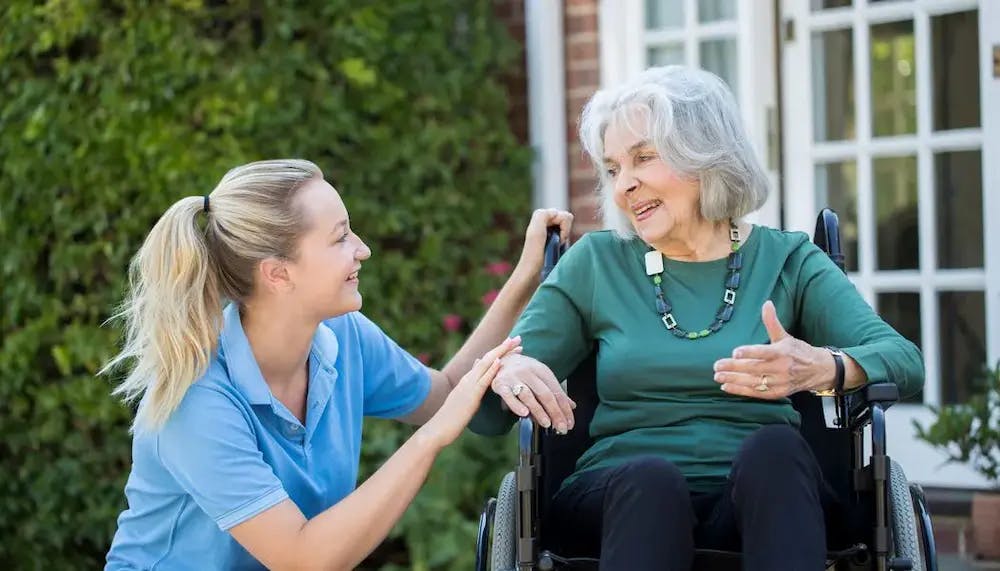What Do Carers Do in a Care Home?

Estimated Reading Time: 6 minutes
Many individuals who want to give back are drawn to the idea of working as a carer in a care home, we're going to let you in on what it entails.
Kickstart your care search
Find the best care homes in your area through Lottie.
In this article:
- What is a carer?
- Roles and responsibilities of a carer in a care home
- Average day for a carer
- Challenges
- Why work in a care home
What is a Carer?
Taking on the role of a carer working in residential care homes or nursing homes is an extremely rewarding feat.
Professional carers provide physical and emotional support to individuals to help them overcome the everyday difficulties they face. They can help with everyday life care, helping clients with medical conditions, supporting residents mental health and well being and general daily living support.
Roles and Responsibilities of a Carer in a Care Home
As a care worker in a residential home, you’ll provide personal care, including assistance with washing, dressing, foot care and applying lotions. You’ll also offer physical and emotional support to residents where needed, as well as help with daily or administrative tasks.
Here are the main responsibilities of a carer in a care home:
- Providing personal care for each resident, including things like help with washing and bathing
- Administering medication
- Helping residents engage in social and leisure activities to ensure they're stimulated
- Emotional support and companionship
- Maintaining general upkeep such as cleaning, restocking and tidying
- Protecting residents’ personal belongings
- Keeping accurate records on all forms and systems
- Reporting changes of any mental or physical changes in residents to the supervisor
- Being aware of and upkeep the care home’s emergency procedures and security precautions
- Upholding the care home’s policies

The main responsibility of care workers is to ensure the general wellbeing of residents and to make sure their care needs are met. Carers also spend time assisting the qualified nurses with their duties and maintain the confidentiality of each resident at all times.
Whilst care assistants can be put in some challenging situations, it’s important to remain professional, polite and always be aware of residents' boundaries.
Average Day For a Carer
The average day can depend on the size of the care home as well as the type of care that it offers. Whilst each carer will have completely different experiences, here is an average day of a care home worker.

From the morning, carers can expect to help with assisting residents get ready for the day before or after enjoying breakfast. During this time, the medical rounds will usually begin, this allows time for medications that need to be taken before and during breakfast and there will be many of these throughout the day.
Once breakfast is over, carers assist residents with how they would like to spend their day, whether it be relaxing in the communal lounge, walking around the gardens or simply staying in their room.
For those who need assistance with eating, carers will provide the needed care at lunchtime as well as another medical round. If there are residents who are unable to leave their beds and require more extensive care, this may involve contacting the nurses or a GP if this is a change to their normal condition.
During the afternoon, carers can encourage residents to enjoy the range of activities that are organised by the care home's activity coordinator, or to spend time relishing in their hobbies such as gardening, knitting or reading. An important part of being a carer is to ensure residents are provided with companionship and the level of independence in care they feel the most comfortable with.
During the evening, carers assist residents in enjoying a nutritious and delicious home-cooked meal and then help escort them to where they’d like to spend their evening, whether it be the communal room or their own room. Every single bedroom has a call system to which carers can respond quickly at any time of the day or night. Carers also carry out extra checks to residents living with conditions such as dementia as they may not be able to call for assistance.
Challenges
Whilst being a care worker is an exceedingly fulfilling vocation, the role does come with unique challenges and those wanting to take on the role of a carer in a care home must be aware of the challenges ahead.
Being a care worker in a care home can prove to be a very physical role. Assisting elderly individuals as they go about their day can be tiring, so carers need to look after their own physical health as well. Whilst some duties that are expected of carers may seem daunting at first, with the correct training and support, care home workers are completely prepared to handle these kinds of obstacles.
As well as the impact caring may have on your physical health, there can also be some psychological impacts.
Carers are often faced with looking after residents who are living with debilitating conditions such as dementia or other learning disabilities and they must learn to overcome these challenges to establish a compassionate relationship on which excellent care provision can be built. Compassion fatigue is also a type of burnout that occurs in individuals who help others who are suffering from traumatic experiences and is common in roles that revolve around caring for others. Caring for others can be emotionally exhausting and whilst there are many ways to cope with compassion fatigue, carers are expected to be an emotional source of strength for those around them and must remain professional at all times.
Taking on the role of a carer requires the willingness to get stuck in. For example, attending to the care needs of vulnerable adults who may be unable to wash or dress themselves requires a compassionate individual who is always willing to help.
Why Work in a Care Home
By no means is being a care worker in a care home an easy job, but it is one of the most rewarding ones out there. The beauty of working in a care home is that no two days are the same, and it allows you to make a true difference in individuals' lives, including your own.
Care home workers get to see the impacts of their hard work through the gratefulness of the residents and their loved ones. Starting a career as a care worker is an incredible start to a long, fulfilled and varied journey.
There are also many different prospects for career development. If you have genuine compassion for the elderly and are always striving to help others, maybe a role as a carer is the one for you.
You can read more on the Care Quality Commission website.



